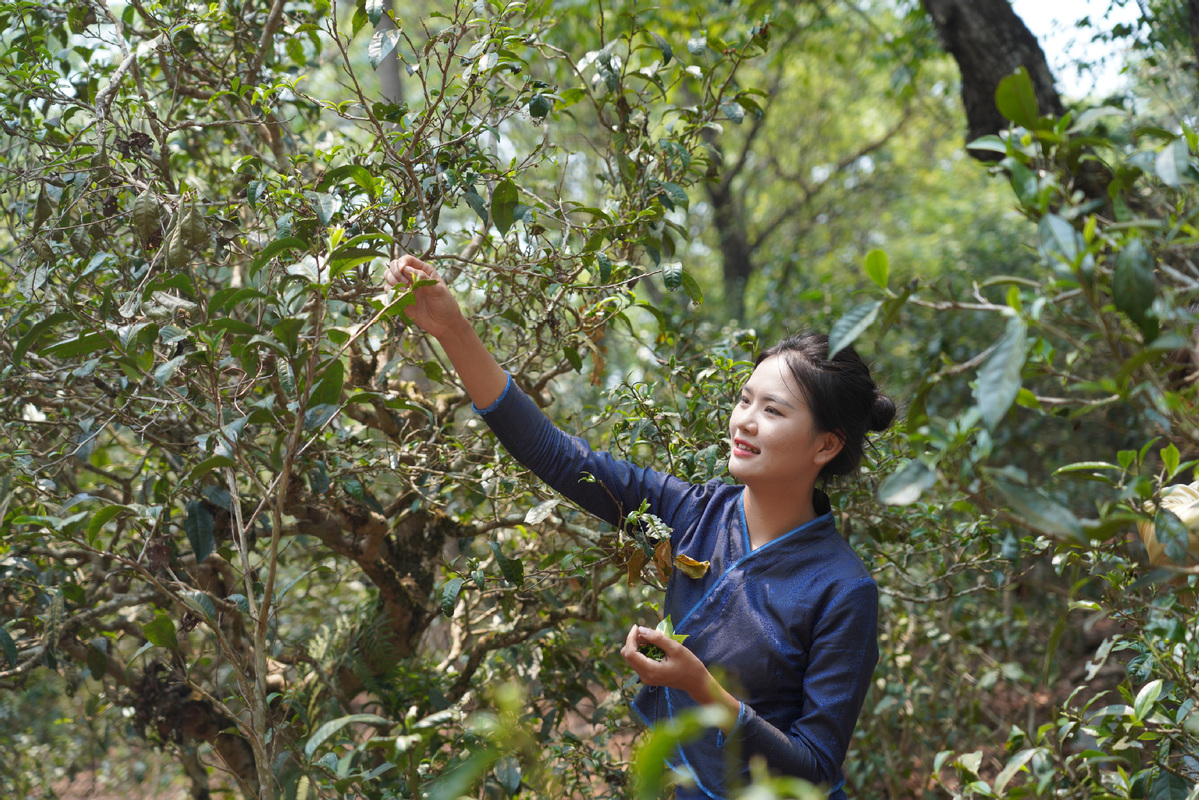
A farmer picks tea leaves at an old tea forest area of Jingmai Mountain in Pu'er, Southwest China's Yunnan province, April 19, 2023. [Photo/Xinhua]
A resident of Wengji village atop Jingmai Mountain in Yunnan province, Yu Xuan has been busy through the weeklong National Day Holiday that ended on Monday, showing around visitors and explaining to them how locals cultivate tea in the region under a canopy created by forests.
This unique method of growing tea, which helps filter sunlight and ensures enough moisture in the soil, has been in practice for generations, the 22-year-old from the Blang ethnic group said.
Today, thanks to improved road infrastructure and housing, access to the village is much easier than before. More accessibility has meant more opportunities for local residents to trade in tea especially with China determined to leave no ethnic group behind in advancing Chinese modernization and achieving common prosperity, Yu said.
"The country has put a tremendous amount of effort into improving the lives of people in areas with large ethnic populations, and the results are obvious because our life in the village has been transformed," said Yu, who is piloting new methods of cultivation that she learned at Yunnan Agricultural University to manage the family's tea plantation.
Ever since the cultural landscape of old tea forests of Jingmai Mountain in Pu'er was made a World Heritage Site in September last year, more and more people have been visiting the area, Yu said.
"Besides learning about each other's traditions and cultures, people now understand that we are all equal members of the community for the Chinese nation. I believe it's important for people from China's 56 ethnic groups to be united and work together to make the country stronger and our life even better."
Ethnic unity is greatly valued by President Xi Jinping. During a grand meeting held in Beijing on Sept 27 to honor role models for ethnic unity and progress, he once again called for consolidating and developing the unity of the Chinese nation.
Xi said at the meeting that the Communist Party of China has always attached great importance to ethnic affairs. Over the past more than a century, it has created the correct path of handling ethnic affairs with a distinctively Chinese approach.
Along this path, Xi said, the CPC has made new advances in developing ethnic relations of equality, solidarity, mutual assistance and harmony, and promoted economic and social development of ethnic areas and the lives of ethnic minority groups to register unprecedented progress.
Xi also highlighted key aspects of the path of handling ethnic affairs with a distinctively Chinese approach, which include maximizing cohesion among all ethnic groups, adhering to the principle of equality for all ethnic groups, opposing ethnic oppression and discrimination, and properly balancing the safeguarding of national unity with the implementation of regional ethnic autonomy.
Furthermore, he called for efforts to guide all ethnic groups toward firmly embracing the sense of a community for the Chinese nation — an important notion put forward by Xi in May 2014. Since then, he has on many occasions including meetings and visiting areas with large ethnic populations stated the profound implications and great significance of consolidating such a sense.
At the 19th CPC National Congress in October 2017, the idea was officially written into the Party's Constitution.
As early as the 18th National Congress of the CPC in 2012, Xi emphasized the importance of building an interconnected social structure and community environment and creating social conditions for people from all ethnic groups to live, study, work and enjoy themselves in.
In December, Xi visited Panlong community in Nanning, capital of the Guangxi Zhuang autonomous region. The community has a permanent population of 27,000, about one third of which are from ethnic groups such as the Zhuang, Yao and Miao.
To fulfill the residents' needs for different cultural activities, the community arranges an array of events for residents from different ethnic backgrounds, covering everything from the Mid-Autumn Festival to "Sanyuesan," a traditional festival of the Zhuang ethnic group, which literally means the third day of the third month in the Chinese lunar calendar.
"As people of all ethnic groups sing and dance together, live and work together, the Chinese nation is closely united, like pomegranate seeds, which stick together," Xi said during the inspection.
Liu Jian, a resident of the community, said she enjoys the atmosphere of the community.
"The residents from different ethnic groups here are like one big family," Liu said.
Xi also said that Guangxi's efforts to build a demonstration zone for forging a strong sense of community for the Chinese nation should start at the community level.
In June, Xi visited a multi-ethnic residential community in Yinchuan, capital of the Ningxia Hui autonomous region. Of over 18,000 residents in the community in Jinfeng district, 38 percent belong to ethnic groups such as Hui, Manchu, Mongolian and Tibetan.
"The Chinese nation is a big family," Xi said to the residents, calling for continued efforts to foster a strong sense of community for the Chinese nation and pool strength from all sectors to advance Chinese modernization.
cuijia@chinadaily.com.cn